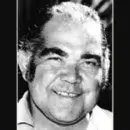
Alfonso Alex Ortiz
Alfonso Alex Ortiz was a Native American scholar, cultural anthropologist, and activist, notable in academia for being a member of the Tewa Pueblos of Ohkay Owingeh whose primary field of study was his own people.
Ortiz was educated at the University of New Mexico (B.A. in anthropology, 1961) and the University of Chicago (M.A. in anthropology, 1963; Ph.D. in anthropology, 1967). He began his teaching career at Pitzer College (1966–1967) and Princeton University (1967–1974), but spent most of his career at the University of New Mexico (1974–1997). Ortiz combined scholarship in cultural anthropology with activism concerned with the status and welfare of minorities.
His fields of interest included ritual drama, myth, comparative traditional histories, and contemporary Indian affairs. He was the author of The Tewa World: Space, Time, Being, and Becoming in a Pueblo Society (1969), a pioneering exploration of Southwestern Indigenous society. He also published American Indian Myths and Legends (coedited with Richard Erdoes, 1984) and edited New Perspectives on the Pueblos (1972) and volumes 9 and 10 of the Handbook of North American Indians (1979, 1983).
Ortiz served as president of the Association on American Indian Affairs (AAIA; 1973–1988), the nation’s largest citizens’ advocacy group for Native Americans. As president of the AAIA, Ortiz was credited with the reclamation of the Taos Pueblo people’s sacred Blue Lake, the assessment of the Alaska Native Claims Settlement Act, and the passage of the Indian Child Welfare Act. He also chaired the National Advisory Council of the D’Arcy McNickle Center for the History of the American Indian at the Newberry Library in Chicago.
In 1975, he was awarded a fellowship by the John Simon Guggenheim Memorial Foundation. In 1982, he received the Achievement Award from the Indian Council Fire of Chicago and was named a MacArthur Fellow by the John D. and Catherine T. MacArthur Foundation.